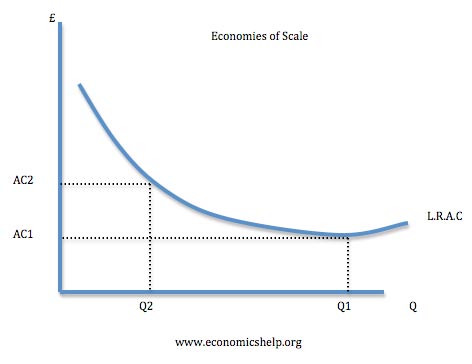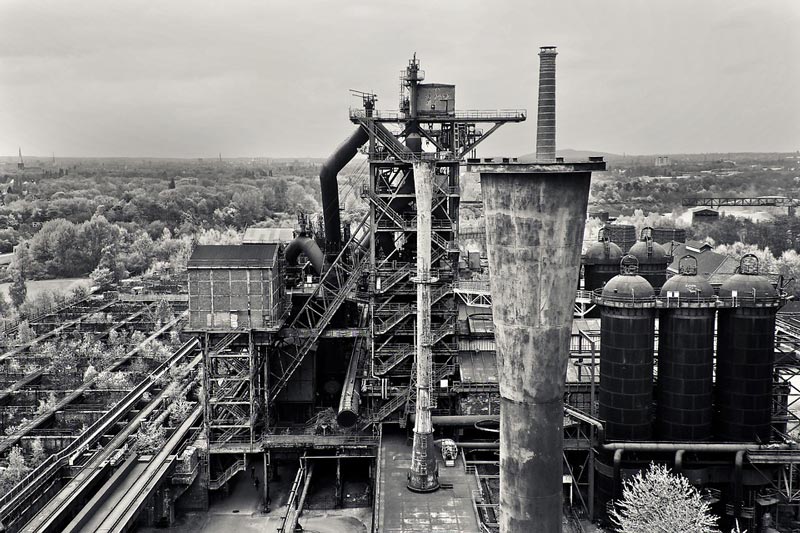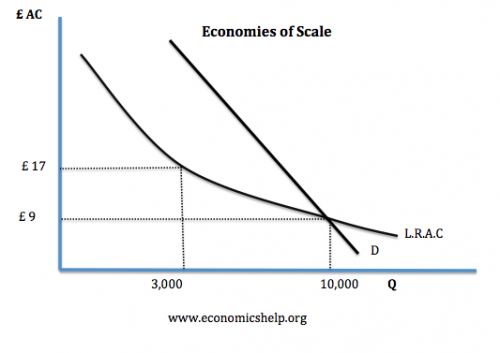Readers Question: Why do monopolies occur in industries with substantial economies of scale?

Question: As a result of large-scale production, the long-run average cost of production falls. This means that a monopoly can emerge in time naturally because of the relationship between average cost and the scale of an operation (Why? I don’t understand)
The diagram above shows an industry with economies of scale. This means as output increases, the long run average cost falls.

Imagine the steel industry. Suppose it costs £10 million to build a steel factory. With this high fixed (capital) cost, the more you produce, the lower the average cost per unit of steel.
If a firm increases output to Q1, it will have a low average cost of AC1 (e.g. £3). This means that smaller firms producing Q2 will have a higher average cost AC2 (e.g. £6)
This means the smaller firm is facing much higher average costs and is unlikely to be able to survive. The biggest firm producing at Q1 could sell goods for £4 – leaving a profit margin of £1. But, if the smaller firms face average costs of £6 when the price is £4 – it will make a loss, and therefore leave the business.
Example. Suppose e a car firm has a very small scale of production, and therefore it can’t benefit from economies of scale. It’s average costs are say £15,000 per car. But, because a big firm, like Ford, can produce cars at £12,000. The small firm may go out of business or Ford may take over the smaller firm.
Because new firms cannot hope to produce and sell quantities of output similar to that of the monopolist, thereby achieving the low costs of the monopolist, they will not enter the industry. (I don’t understand that part too. )
Producing an aeroplane has huge fixed costs and significant economies of scale. Since the 1990s, there are only two big producers – Aerobus and Boeing. There used to be more aeroplane producers, but they merged to get lower average costs.
Would it make sense for a new firm to enter this industry? e.g. could Virgin diversify into producing their own planes?
No. A new firm would face very high average costs. They would have to invest a lot of money they probably wouldn’t get back.
Perhaps it would cost Virgin £1billion to develop and produce a modern plane, but if they only sold 100 planes – the average cost would be very high. Virgin would be better off buying planes from existing two firms who can benefit from the large economies of scale.
What is a natural monopoly? Why will it produce output at a lower per-unit cost than two or more firms in the industry? and why for the graph of minimising costs in a natural monopoly, as there are more firms, the quantity of output decrease yet the cost per unit is higher?

- Suppose the industry demand is 10,000 units.
- If a firm produces 10,000 units, it will get the lowest possible average costs – £9.
- If there were three firms producing 3,000 units. The firms would have average costs of £17.
- Therefore, the optimal number of firms in the industry will be one (one firm producing all 10,000 units)
- More on natural monopoly
Related

for the first part. so the average cost here meaning is the opportunity cost incurred. If a firm has a larger capital, they can cover up the opportunity cost they forgo? That is why they can survive while the small firm cannot. Am i correct?
Yes. Though I think it is simpler. the large firm just gets lower average costs because it can produce more.
monopolies can also occur without economies of scale. witenss the case of Amazon.com. The capital markets have given Amazon a pass to allow it to keep growing and growing without economies of scale, and without “profits” accruing because costs rise the same as sales.
“If there are substantial economies of scale to exploit, a monopolist will be more productive efficient than many competitive firms in the market, and the monopolist will also be allocative efficient.” Can someone explain to me if this claim is true, and to what extend.